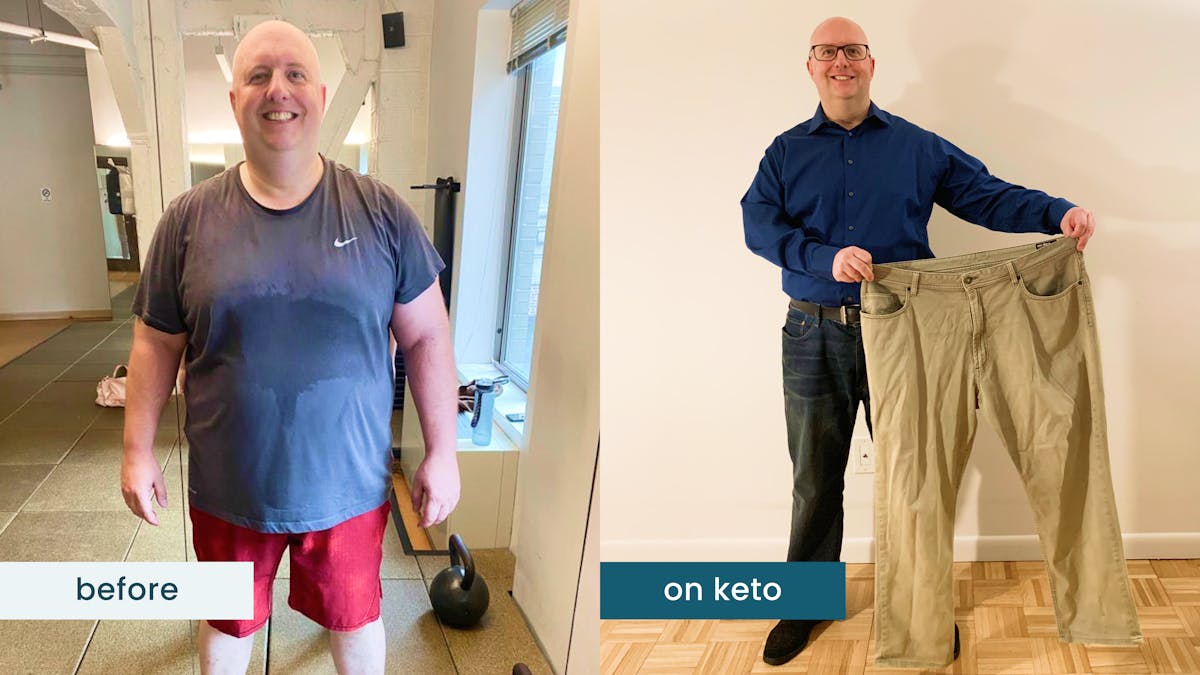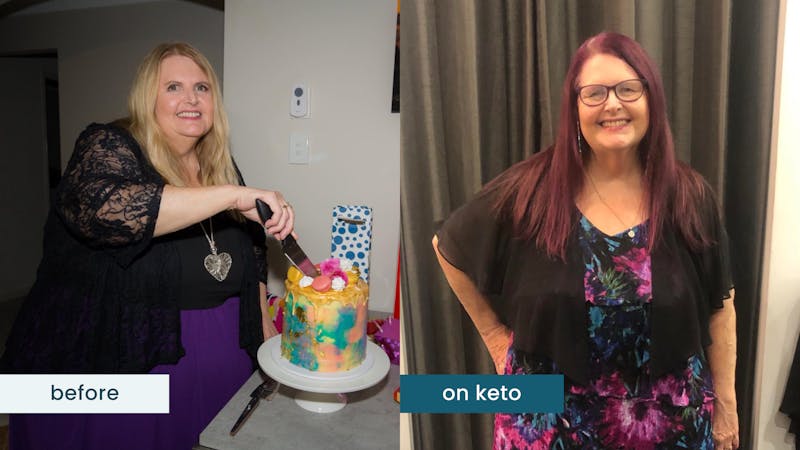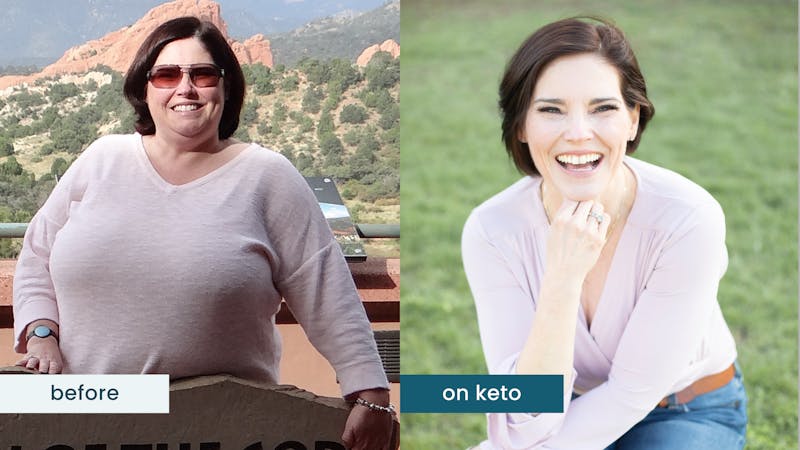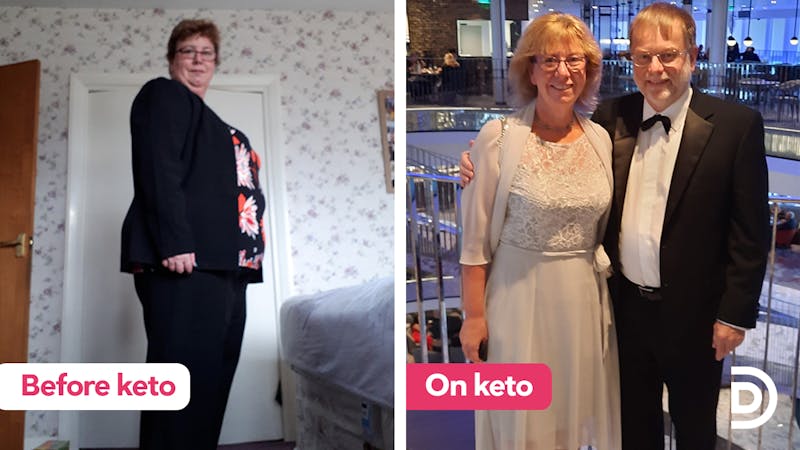“It really IS possible to reverse metabolic syndrome”

Arthur had tried many diets over the years, but always found they took tremendous willpower, left him hungry, and he would eventually regain all the lost weight.
When his doctor told him his liver enzymes indicated worsening fatty liver disease, he knew he had to find a diet that worked for him.
He finally tried a low-carb diet in June 2021. And in just five months he experienced tremendous success — not only in reversing his fatty liver, but losing 40 pounds (18 kilos), and improving his blood sugar.
When we caught up with him again in mid-December, he had lost another 8 pounds, for a total of 48 pounds (22 kilos) in seven months.
“I believe I am living proof that a low-carb lifestyle can truly be transformational — even in a short period of time!” Arthur says.
Arthur’s story has been lightly edited.
What is your name, age, and where do you live?
I’m Arthur Rabatin, 52. I live in New York City, but grew up in Vienna and lived over 20 years in London prior to moving to NYC three years ago.
How and when did you decide to do low carb or keto?
I was interested in low carb for many years but it was not until June 2021 that I decided to follow a low-carb lifestyle.
I did a lot of research over the years on everything from calorie restriction, exercise for weight loss, vegetarian/vegan food, and finally low carb. The low-carb message made the most intuitive sense for me, particularly given my prediabetes and my dad’s diabetes.
In early 2021, my doctor told me that my liver enzyme values had worsened and that I was at risk of long-term liver damage (nonalcoholic fatty liver, or NAFLD).
This made me decide to use the knowledge I’d gathered and focus on a low-carb lifestyle.
Did you have any health or weight struggles before going low carb or keto?
Yes, very much so. I’ve had weight problems all my life. I tried various diets (liquid diets, vegetarian/vegan, calorie restriction).
And despite some of them having limited success, in every case I never lost more than 20 pounds (9 kilos) and it required an enormous amount of willpower — only to see my weight climb back up.
What were you eating before making this lifestyle change?
I would order a lot of takeout meals, which had sweet sauces, and a lot of processed food — from fried chicken to pizza.
I was a big fan of bread with most meals. I used to drink a lot of orange juice, too, believing it was healthy.
The main thing was that despite eating a lot, I would always be hungry. I had no sense of satiety and I could not distinguish between my hunger and just appetite. I would eat and eat until physically “full.”
In what ways has your health improved?
In every way!
I started the low-carb diet on June 5, 2021; in just five months, up to October 31, 2021, my weight dropped from 288 pounds (130.5 kilos) to 242.5 pounds (110 kilos). And it continues to improve. As of mid-December I had lost a total of 48 pounds (22 kilos).
I hope to eventually get to 188 pounds (85 kilos) and feel confident that I will get there in time.
In that same five-month time period:
- My waist size shrunk from 54 inches (137 cm) to 47 inches (120 cm). And it is getting smaller every day.
- My fasting glucose went down from between 120 and 130 mg/dL to between 85 and 100 mg/dL.
- My A1C went down to a healthy, normal 5.2%.
- My liver enzymes improved. My ALT went from 82 U/L down to 22 U/L; my AST went from 80 U/L down to 19 U/L. And they continue to improve.
- My triglycerides went from 130 mg/dL to 114 mg/dL.
The ‘’starting values” were blood tests done June 7, 2021, right at the start of my lifestyle change. This is a significant improvement in all blood markers in just five months.
What does a typical day of eating and/or fasting look like for you now?
I’ve managed in the last months to start listening to my body and to develop a more natural feeling for hunger and satiety.
Not eating carbs has allowed me to regain a healthy sense of when, and how much, I need to eat. I never go hungry, but I also avoid eating when I am not hungry. So if I am not hungry in the evening or morning I would not eat even if it was “dinner time” or “breakfast time.” I rarely consciously fast, but I often go 16 hours without food simply by eating only when hunger kicks in.
My food mostly consists of eggs and organic, pasture-raised meat products. I cook at home every day and make meat quality the center of my meal. I am very particular about meat quality.
On a typical day I would have four or five eggs in a generous portion of (grass fed) butter. Occasionally, I would mix some vegetables into that.
I often cook in advance, so for lunch or late lunch/early dinner I would have a meat dish with some non-starchy vegetables on the side — but often without. I get variety by eating different meats (including heart and liver), and switching between boiling soups, with stews or grills.
When I go to a restaurant, I always choose the least processed food option — which would typically be grilled meat or fish.
Do you think exercise is necessary for success on low carb?
I believe that exercise is extremely healthy and beneficial for physical and mental health — particularly as we age — and for everyone with a sedentary lifestyle or office job.
However, exercise does not make up for a bad diet. So a good diet is important for health, irrespective of the amount of exercise.
I know from my own experience that I gained weight while training for marathons because I mistakenly believed I could eat whatever I liked because my training would “burn the calories off.”
What are your top three tips for people starting low carb?
- Accept it is a journey and don’t look at the scale every day. I had a lot of success in a short period of time, but there are days where weight fluctuates; don’t let yourself be frustrated.
- Understand that high-carb food is addictive, and processed food is made to be addictive. Learn about the psychological effects of removing high-carb food from your reach and putting it out of sight.
- Think of it as an investment in your health and enjoy the quality of food you will be consuming.
Final thoughts or takeaway?
I’m living proof that a low-carb lifestyle can truly be transformational — even in a short period of time!
I would love to motivate others and prove, like many others have, that it really is possible to reverse metabolic syndrome.
I am a big fan of Diet Doctor. The role that organizations like Diet Doctor play in educating the world can hardly be underestimated, and I wish I had known about the low-carb lifestyle before.
My dad suffered from diabetes and he became blind when my sister and I were not even 14 years old. We had to watch him suffer from the consequences of diabetes until his death.
If the low-carb message can help reverse metabolic disease and diabetes, then it is worth a Nobel prize in my eyes!
Finally, I want to give a big thanks to my coach and trainer, Chantha Thach, who is supporting me on this journey and who is with me in all ups and downs!
Reversing your nonalcoholic fatty liver disease in just five months is an amazing accomplishment, Arthur.
Plus, your growing awareness of hunger and satiety signals will set you up for long-term success. Thanks so much for sharing your story.
~Anne Mullens
Share your story
Want to share YOUR success story with Diet Doctor? Send an email to success@dietdoctor.com. Feel free to use the questions on this page as a starting point.
Share your story

